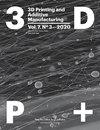Thermomechanical Properties of Polyjet Voxel-Printed Parts and the Effect of Percolation
IF 2.1
4区 工程技术
Q3 ENGINEERING, MANUFACTURING
引用次数: 0
Abstract
The use of deformable materials in 3D printing has allowed for the fabrication of intricate soft robotics prototypes. Polyjet technology, with its ability to print multiple materials in a single print, has been popular in creating such designs. Vero and Agilus, the commercial materials provided by Polyjet, possess shape memory properties, making Polyjet ideal for high-precision and transformable applications. Voxel printing, where users assign materials to voxels, has allowed for the further expansion of design possibilities by tuning the properties of the jetted material. This study aims to investigate how different compositions of uniformly distributed Vero and Agilus voxels affect the thermomechanical properties of the voxel-printed part. In addition, high stiffness Vero droplets surrounded by a soft matrix of Agilus resemble polymer composites, thus calling for the examination of percolation, which is an important phenomenon in polymer composites. The study explores the presence of percolation in voxel-printed mixtures of Vero and Agilus and its impact on mechanical properties. Using dynamic thermomechanical analysis and thermomechanical analysis, the study characterizes the glass transition temperature (), maximum allowable strain, and modulus of the voxel-printed material at different compositions. The study found a highly linear relationship between and maximum yield strain with composition, and maximum yield strain occurs at 7°C above . On the other hand, there is a nonlinear relationship between the modulus and composition, which suggested that the percolation phenomenon might have altered the load distribution, therefore causing this inconsistency. So, in this study we used light microscopy, Monte Carlo simulations, and provided mathematical proofs to reveal the percolation threshold in voxel-printed parts, where Vero droplets suddenly form a single network that spreads across the material, altering the load distribution. This study is the first to highlight the percolation phenomenon in Polyjet voxel-printed parts and provides a useful guide for researchers in selecting suitable materials for their specific applications.聚喷体素打印件的热力学性能及渗透的影响
在3D打印中使用可变形材料可以制造复杂的软机器人原型。Polyjet技术,凭借其在一次打印中打印多种材料的能力,在创建这样的设计中很受欢迎。Polyjet提供的商业材料Vero和Agilus具有形状记忆特性,使Polyjet成为高精度和可转换应用的理想选择。体素打印,用户将材料分配到体素,通过调整喷射材料的属性,可以进一步扩展设计的可能性。本研究旨在探讨均匀分布的Vero和Agilus体素的不同组成对体素打印部件的热机械性能的影响。此外,被Agilus软基质包围的高刚度Vero液滴类似于聚合物复合材料,因此需要对渗透进行研究,这是聚合物复合材料中的一个重要现象。该研究探讨了Vero和Agilus体素印刷混合物中渗透的存在及其对机械性能的影响。通过动态热力学分析和热力学分析,表征了不同成分下体素印刷材料的玻璃化转变温度()、最大允许应变和模量。研究发现,最大屈服应变与成分呈高度线性关系,最大屈服应变出现在7°C以上。另一方面,模量与成分之间存在非线性关系,这表明渗透现象可能改变了载荷分布,从而导致这种不一致。因此,在这项研究中,我们使用光学显微镜,蒙特卡罗模拟,并提供数学证明来揭示体素打印部件的渗透阈值,其中Vero液滴突然形成一个单一的网络,在材料上扩散,改变负载分布。该研究首次突出了Polyjet体素打印部件中的渗透现象,并为研究人员选择适合其特定应用的材料提供了有用的指导。
本文章由计算机程序翻译,如有差异,请以英文原文为准。
求助全文
约1分钟内获得全文
求助全文
来源期刊

3D Printing and Additive Manufacturing
Materials Science-Materials Science (miscellaneous)
CiteScore
6.00
自引率
6.50%
发文量
126
期刊介绍:
3D Printing and Additive Manufacturing is a peer-reviewed journal that provides a forum for world-class research in additive manufacturing and related technologies. The Journal explores emerging challenges and opportunities ranging from new developments of processes and materials, to new simulation and design tools, and informative applications and case studies. Novel applications in new areas, such as medicine, education, bio-printing, food printing, art and architecture, are also encouraged.
The Journal addresses the important questions surrounding this powerful and growing field, including issues in policy and law, intellectual property, data standards, safety and liability, environmental impact, social, economic, and humanitarian implications, and emerging business models at the industrial and consumer scales.
 求助内容:
求助内容: 应助结果提醒方式:
应助结果提醒方式:


